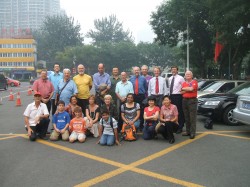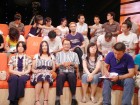Thanks to Michael Crook for the group picture, taken during (one of the…) rehearsal on 25 September.
Also here the article of China Daily – but with our names corrected…
No comments on the text!
23 September 2009 – Expats leap at parade opportunity
By Chen Jia (China Daily)
They are not Chinese but they will have pride of place on Oct 1 when the nation celebrates New China’s 60th anniversary.
For nearly 200 expats taking part in the Beijing parade that will pass the country’s leaders next to Tian’anmen Square, National Day offers the opportunity of a lifetime.
“My family is so lucky to have four places on the floats,” said 49-year-old Feng Crosland, an Australian who works for the Beijing branch of Robway Crane Safety System (Tianjin) Co Ltd.
“I was born in Beijing and it is a valuable chance for me to let my children and husband feel my love for the land of my birth on its 60th birthday,” she said.
Four members of her family are set to be among around 25 foreigners on the floats.
Some 155 expats are expected to take part on foot, including 70-year-old Wacquant Francis Rene, from France, who is likely to be the oldest foreign-born participant.
More overseas citizens are taking part in the parade this year than in the past. They include: foreign students, professors, engineers, businesspeople, scholars and cultural experts and they hail from Australia, Belgium, Canada, France, Germany, India, Italy, New Zealand, Nigeria, Sweden, Turkey, the US and the UK.
Crosland said her family is excited about getting involved. Her husband is currently in Australia but he plans to wrap up business there soon, so he can join her and their children in Beijing for the parade.
“My little girl loves Chinese culture so much and she spoke fluent Chinese to welcome President Hu Jintao when she studied in the Fangcaodi Primary School,” she said.
Her 12-year-old daughter, Elizabeth Lois Crosland, was part of the closing ceremony at last year’s Beijing Olympic Games.
Among overseas families taking part are Belgian Gilbert Van Kerckhove, a senior consultant to the city’s development and reform commission, and his wife Sun Bin.
English professor David Tool, from the US, Swedish entrepreneur Roger Eriksson, Nigerian student Ifeoma Onyinye and Edwin Maher, from New Zealand, a host with Central China Television’s English channel, will also take part.











